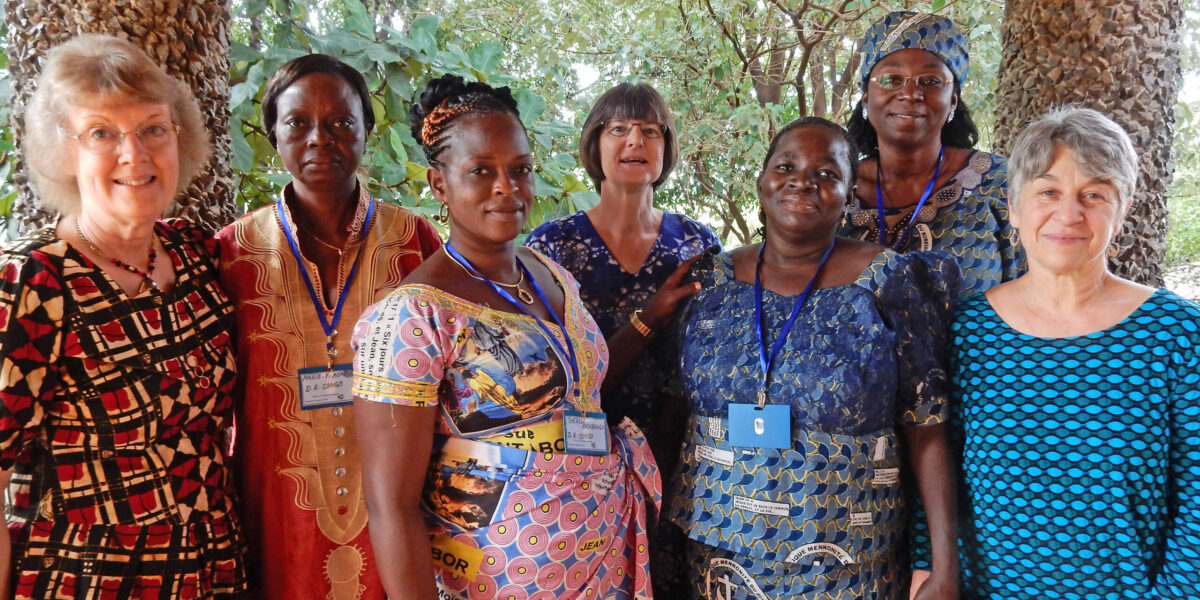KISUMU, Kenya (AIMM/Mennonite Mission Network/Mennonite Women) – The first Sister Care seminars on the African continent introduced some new challenges for co-presenters Carolyn Heggen and Rhoda Keener. Although they have guided about 3,700 women in 15 countries through reflections and group experiences to promote healing and empowerment, this time they struggled to communicate the concept of self-care.
Keener said that gradually it became clear that most African women work so hard and have so many responsibilities that they haven’t stopped to think about their own needs.
Noëlie Bananzaro, a seminar participant from Burkina Faso, affirmed that self-care was a new idea for her, but one that she now sees is necessary to sustain ministry.
"In our context, we always take care of others, but we don’t always consider the importance of taking care of ourselves," she said. "If we don’t take care of ourselves, we will not be able to take care of others in the long run."
The Sister Care seminars, one in Kisumu, Kenya (Mar. 31-Apr. 2), and the other in Dodoma, Tanzania (Apr. 7–9), brought together 83 women from five countries, spanning eastern, central and western Africa. Six agencies, plus individual donors, collaborated to offer these Sister Care experiences.
Africa Inter-Mennonite Mission and Mennonite Mission Network were represented in Kenya by five women: Noëlie Bananzaro, Nancy Frey, and Claire Traoré from Burkina Faso, and Marie Fumana and Thèrese Tudiakuile from Democratic Republic of Congo. Participants from each of six Mennonite dioceses in Kenya and 10 in Tanzania attended the Sister Care seminars, along with one woman from Uganda.

Thèrese Tudiakuile takes notes during the first Sister Care seminar on the African continent. Photo provided.
Four languages were used during the course of the seminars, Luo and Swahili, and English and French. In Kenya, Tanzania and Uganda, English is the language of higher education. Frey served as translator for the women from Burkina Faso and Congo where most schools teach in French.
Traoré said that in the Sister Care seminar she learned that other women can help us feel the presence of God in tangible ways. She described this kind of experience as "God-with-skin-on," someone with whom we can share what is on our heart and who can affirm that she has heard us."
Bananzaro and Traoré became examples of God-with-skin-on to their sisters in three countries, as immediately upon their return from Kenya they began an arduous month-long trip overland through Mali to Senegal to participate in a seminar. Their return to their own country became an evangelism tour as they visited churches along the way. They also shared portions of the Sister Care training during a gathering of Mennonite pastors’ wives, and are preparing to incorporate Sister Care elements in the national Mennonite women’s retreat in 2017.

Claire Traoré converses with Nancy Frey during
the first Sister Care seminar on the African continent. Photo provided.
During the Kenyan Sister Care event, Rebecca Osiro, pastor of a Nairobi congregation and vice president of Mennonite World Conference, spoke about the relationship between Naaman’s wife and a slave girl. This story, told in 2 Kings 5, describes how a young girl from Israel and her mistress, wife of a Syrian army commander, worked together to bring healing to Naaman, a powerful man who could find no cure for the leprosy that spread over his body. This message continued to inspire Nancy Frey weeks after the conference.
"The mistress and slave girl overcame barriers of status, race, religion, age to find a solution to their common problem. Rebecca’s message was a reminder that women need to bridge the gaps that divide us if we want to make things happen," Frey said.
In responding to the question of why she invests so much in the Sister Care ministry, at a time in life when many people are focusing on retirement, Carolyn Heggen said that she is "grateful beyond measure to be able to share Sister Care and to develop significant friendships with Christian women around the world."
Throughout much of her career, Heggen’s professional and personal interests have focused on helping people heal from life’s wounds, and how religious teachings can either help or hinder growing into wholeness. As she works in international settings, she sees how women in all cultures have similar heart-needs. She said that her teaching has become richer through incorporating their wisdom.
"Sister Care combines insights from psychology with biblical principles, and expresses them in practical ways that help women honor and learn from their own journey, so that they might then support and help others heal," Heggen said.
Looking ahead in the coming two years, Sister Care has already scheduled events in Guatemala, Argentina, Colombia, India and Indonesia, in addition to multiple events in North America.







